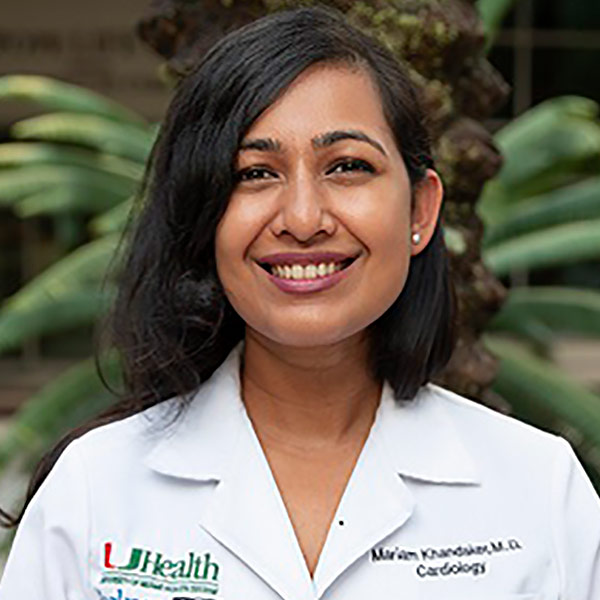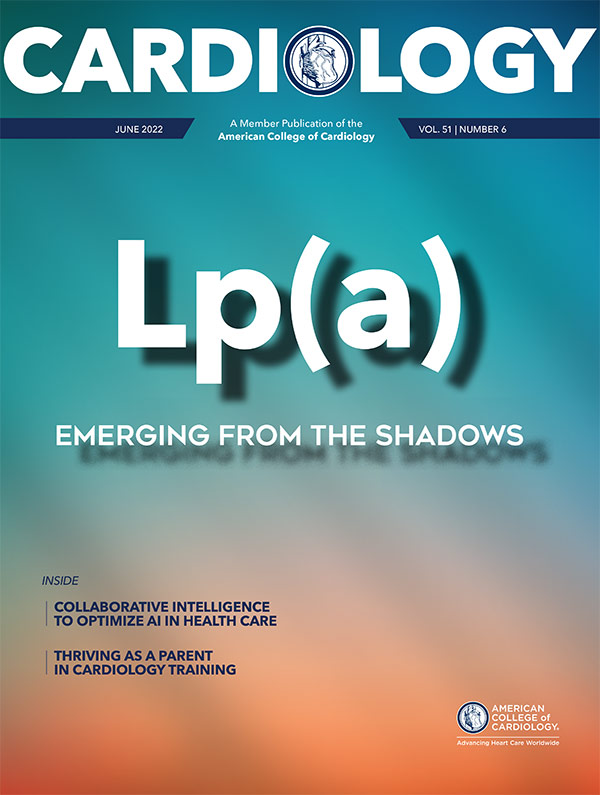Feature | On the Ground Around the World

Of ACC's more than 56,000 members, approximately 16,000 are from outside the U.S. These members who live and work in more than 140 countries around the world, share many of the same challenges and concerns as their U.S. colleagues when it comes to managing and treating cardiovascular patients, yet they also face many unique issues specific to their region or country related to economics, geographic size, politics, and other factors. The following perspectives – one on a typical day in a South Asian cath lab and the other on mental health in Africa – offer firsthand insights into the work being done – and the challenges being faced – around the world to advance solutions to heart health.
Reflections From a South Asian Cath Lab
It was a regular day at the National Heart Foundation and Research Institute (NHFRI), a 480-bed cardiac hospital nestled in the hustle and bustle of the Mirpur neighborhood in Dhaka, Bangladesh. The street was busy with activity: the tinging of rickshaw bells, traditional clay pots being sold opposite the hospital, school children playing cricket in the nearby playground, and waves of people going about their daily lives.
I made my way through the busy crowd of patients and families to the cardiac catheterization lab. I looked at the white board where the cases for the day were listed – all 67 of them. A nurse, likely noticing my wide eyes above my mask commented, "This is the average number of cases in a typical day. A busy day would be over 80 cases." Clearly this was a bustling cath lab, but the mood was light and happy. Patients wearing maroon gowns were being wheeled to the lab and the experienced techs, nurses, physicians and ancillary staff worked efficiently in a synchronized dance.
Connect with the FIT Member Section
Click here to learn about ACC's Fellows in Training Section and engage with your community.
Find Your Chapter
The ACC's 42 International Chapters, including the African Consortium Chapter and the Bangladesh Chapters, are open for ACC members in specific countries or regions interested in cardiovascular disease. Visit the ACC's Global Hub (ACC.org/GlobalHub) for a complete list of International Chapters and to learn more about how to get involved.
For me, it was far from a regular day. I am a cardiology fellow in training at the University of Miami/Jackson Memorial Hospital. This was the first day of my month-long externship at NHFRI in my home country of Bangladesh. I was excited, nervous and grateful. Most of all, I was eager to see what this month held in store.
In the cath lab, after I gained access in a patient with double-vessel disease for whom we planned to intervene, in walked our interventional attending, Fazila Malik, MBBS, FACC. I watched her expertly maneuver the catheter, wire the left anterior descending artery, balloon dilate the vessel and then place a stent. Then repeating the steps on the right coronary artery, she guided me as I wired the artery and then placed a stent. It is always humbling to work with inspiring women in this field, but working with Dr. Malik was particularly special, because to me she goes by a more common name – Mother.
Throughout my childhood, I had watched her work passionately and diligently for her patients, so to stand and work beside her in the cath lab was a true privilege. I found myself musing, "We've never cooked together before, but here we are doing percutaneous coronary intervention together. Who would have thought?"
The month passed quickly. Working at NHFRI was a deeply enriching experience. In addition to the technical training, it was enlightening to work in a new environment. Several things stood out to me during the month.
The troubling state of cardiovascular disease in South Asia struck me first. I knew the causes were multifactorial – a higher prevalence of diabetes, low BMI but a high body fat differential with increased abdominal adiposity, narrower coronary vessels and more multivessel disease all combined with societal factors like diet, inactivity and smoking (including inhaled and smokeless tobacco).
Despite this awareness, seeing firsthand the extent and severity of cardiovascular disease in Bangladeshi women and men was a rude awakening. A typical day brought us a 36-year-old engineer with severe double-vessel disease, a 55-year-old farmer with severe left main bifurcation disease and a mid-40s housewife with a diffusely calcified left anterior descending artery, to list a few. This was an unfortunate pattern: patients – many very young – presenting with typical angina with angiograms demonstrating diffuse coronary artery disease. The multifactorial risk factors meld and feed off one another, with devastating consequences. We are at the tip of the iceberg in terms of fully understanding the cardiovascular risk factors of South Asian communities, and we still have a long way to go.
The second thing that struck me was how nurturing and supportive the NHFRI cath lab environment was for women. My female colleagues and I are acutely aware of our unique situation: in the U.S., among physicians who perform interventional coronary procedures, only 4.5% are women.1 At NHFRI, a female operator in the cath lab was the norm and not an uncommon sight, as it should be. We were happy to highlight this for International Women's Day, when we performed a case with an all-female cath lab team of a tech, nurse, operator and assistant. The NHFRI is just one institution, but it was inspiring to get a glimpse of how things could be.
The third thing that struck me was how nice it was to be back in Bangladesh, back to my roots, even if just for a month. International medical graduates always straddle two worlds. We are grateful to train and pursue our professions and dreams in our adopted country. At the same time, we are forever indebted to the country that birthed, fed and raised us. I often feel guilty for not taking care of the patients in Bangladesh who need my help. There is always a desire to be involved back home, even in a small way. I will be searching for that balance in the coming years.
As I packed my lead shield the last day, everything felt bittersweet. Goodbye NHFRI, goodbye Bangladesh, goodbye Mother. Until next time.

This article was authored by Mariam Khandaker, MD, a FIT at the University of Miami/Jackson Memorial Hospital in Florida (Twitter: @KhandakerMariam).
Reference
- Wang TY, Grines CL, Ortega R, et al. Catheter Cardiovasc Interv 2016;87:663-68.
Mental Health in Africa Amid the COVID-19 Pandemic
The adverse consequences of the COVID-19 pandemic have led to an increased demand for medical services across the globe, particularly in African nations. A medical service area that has been deeply influenced by the pandemic is mental health, where the decline in emotional wellness has brought about a high influx of mental health cases.
For years, mental health, and psychiatric care in general, had been dismissed by leaders in numerous African nations. As a result, a large demographic of people in Africa has not fully acknowledged that mental well-being is as important as physical well-being. Kenyan author Ted Malanda once said that "depression is such a non-issue that African dialects never bothered to create a word for it."
ACC's NCD Academy: Mental Health Course
Learn how to identify individuals struggling with their mental health and to intervene before symptoms become acute by employing screening techniques, prescribing appropriate treatment and engaging mental health specialists for serious cases. The NCD Academy's online mental health course, available in English and Spanish, covers the six common categories of mental health disorders. Visit ACC.org/NCDAcademy for this course and more, all aimed at equipping health care providers with free high quality continuing education available anytime and anywhere.
Lamentably, many African people have yet to change their perspective on mental illness, and the relationship between emotional wellness and offbeat convictions is likely the source of the issue. There is a dire need for mental health promotion and awareness on a public level. Without it, no effective interventions will be established, and the number of mental health cases will continue to increase.
In Nigeria, just 10% of mentally ill individuals approach a therapist. In South Africa, 75% of people have no access to a specialist. Akwasi Osei, MD, CEO of the Mental Health Authority of Ghana, said that "41% of Ghanaians have some type of mental issue, especially mental misery." Moreover, it is possible the pandemic has resulted in a worsened state of mental health and well-being in Africa, including in Ghana, on top of the common taboo culture that surrounds the topic.
Physical well-being has become the primary focus of many individuals across the continent. This is understandable, as the presentation of illness due to COVID-19 has been effectively broadcasted across the continent, as well as globally. Despite this, it should be obvious that psychological well-being has also been greatly impacted. Some of the ways the COVID-19 pandemic has increased the burden of mental illness and distress include:
- Individuals who have lost family members, companions and friends because of the pandemic are experiencing extreme stress and depression, alongside other psychological difficulties.
- People have lost their jobs or have been furloughed with no indication of returning to work soon.
- The preventive measures of the pandemic, including social distancing, quarantining, self-isolating and other means of preventing COVID-19, have separated individuals from their local communities and support systems.
Recommendations to Support Needed Services
African nations should become the hotspot for multilateral aid from global associations like the World Health Organization, United Nations Children's Fund, United Nations Development Programme, World Bank, International Monetary Fund, and many others, to further develop their psychiatric medical care frameworks and empower them to manage the surge in mental health cases.
Doctors, therapists, analysts and other medical services experts ought to be furnished with training and guidelines that empower them to offer the best quality of care throughout their obligations. Hospital administrators ought to be promptly accessible to individuals who seek mental health and well-being care, since promptness of health care services provided to those in need is fundamental. Furthermore, adequate resources for mental health centers should be gathered with the aim of improving services to acceptable standards.
Strategy creators in Africa also need to ensure the privileges and security of patients with mental illness. Such guidelines would prevent the infringement of their common freedoms and poise. Strategy creators should also put forth cognizant attempts to stop the disregard of mental illness.
The uptick in mental health cases during the pandemic should highlight the need to prioritize mental health care as equal to physical health care. It is likewise an ideal opportunity for social orders in the African subdistricts to change their social and strict convictions towards psychological well-being, as opposed to slandering and maintaining old fashioned convictions. Furthermore, teaching and highlighting the importance of mental health should not be limited to those of school-teaching years, and should be available to all members of the community.
As a continent that is home to many communities that uphold conservative views on mental health, Africa has a lot of improvements to make regarding awareness or intervention for mental health, particularly in countries where it is seen as a nonexistent condition.
The COVID-19 pandemic has put a spotlight on mental health and the detriment it has caused for many individuals. Now, it is important that support from organizations, medical services, education and other aforementioned interventions are provided to help tackle this issue and give Africa a positive perspective on mental health – not only in the present, but for the generations of citizens who follow.


This article was authored by Wireko Andrew Awuah, MS, 5th year medical student at the Sumy State University in Sumy, Ukraine and Esther Patience Nansubuga, MBChB, 3rd year medical student at the University of Leeds in the UK.
Clinical Topics: Cardiovascular Care Team, COVID-19 Hub, Prevention, Stress
Keywords: ACC Publications, Cardiology Magazine, ACC International, Ghana, COVID-19, Friends, Pandemics, Bangladesh, Cardiovascular Diseases, Depression, Kenya, Language, Leadership, Mental Health, Mentally Ill Persons, Nigeria, Noncommunicable Diseases, Physical Distancing, Social Media, South Africa, Students, Medical, Taboo, Ukraine, United Kingdom, World Health Organization, Health Personnel, Education, Continuing, Health Promotion, Family, Biomedical Technology, Mental Disorders, United Nations, Demography, Delivery of Health Care, Technology, Workforce, Freedom, Hospitals, Policy, Politics, Burnout, Psychological, Schools, Financial Management
< Back to Listings


